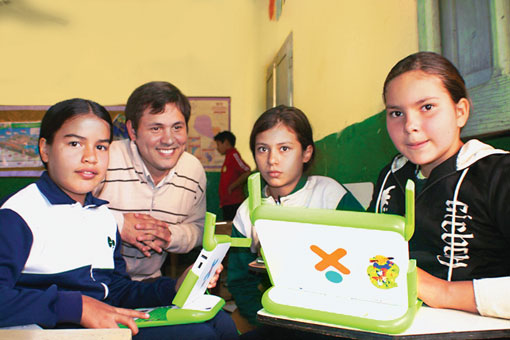More than two-thirds of Paraguayans are under the age of 30. For National Deputy Sebastián Acha, that’s both an opportunity and a challenge. He believes his country’s technologically aware and young population, combined with a growing economy, can turn Paraguay into a regional model for agricultural development, educational innovation and political transparency. In fact, the 2018 presidential hopeful is building his political credentials on that belief.
Acha, 35, is a leading member of Paraguay’s new generation. He became Paraguay’s youngest deputy when he was first elected to Congress in 2003 from a party he helped create, Partido Patria Querida (Our Beloved Nation Party–PPQ). With his second-term victory in 2008, he remains one of the youngest diputados in Paraguay’s history. And he is determined to change Paraguayan politics.
Acha is currently leading an effort to enable voters to elect members of Congress directly, rather than by party list. A bill pending in Congress would “unlock” the listas sábanas (closed lists) in parliamentary elections, increasing transparency and the incentive to vote. The PPQ has compiled over 74,000 signatures supporting the bill, and as of the end of 2011, the initiative was still being debated in the Chamber of Deputies.
Acha has a record of driving political change. He previously collaborated on the automatic electoral registration law, which establishes a procedure for automatically registering a Paraguayan citizen to vote when he or she turns 18—replacing the former time-consuming and bureaucratic process in which citizens had to sign up manually. The law will potentially add 400,000 new voters to the political system. (Although voting is compulsory in Paraguay, many eligible voters had not registered before the law was enacted at the beginning of 2012.)
According to Acha, automatic voter registration will save Paraguay’s government an estimated $45 million in the next year by eliminating 17,000 temporary voter registration jobs. Acha has proposed investing the savings in the Paraguayan branch of One Laptop per Child (OLPC), a U.S.-based nonprofit organization with an eponymous mission and operations worldwide.
“We need to invest not just in education,” Acha says, “but in the implementation of ICTs [information and communication technologies]” that make education relevant to the twenty-first century.
Acha was inspired to enter party politics while he was a law student at the Universidad Nacional de Asunción. In 2000 he helped found the organization Tierra Nueva (New Land) to increase agricultural productivity and diversify crops in the mostly rural department of San Pedro. He recalls meeting families who lacked access to finance and public credit, and observing how “politicians bought and forgot [the rural poor] with ease.”
The young deputy believes one key to exploiting those opportunities is digital inclusion. Outside his congressional duties, he has worked closely with OLPC and its in-country implementing organization, Paraguay Educa (Paraguay Educates), to develop a Center for Digital Culture—a Silicon Valley of sorts—in the city of Caacupé, about 35 miles east of Asunción. The center seeks to become a hub for national and international IT education in Paraguay’s first “digital city.” Caacupé today boasts 100 percent digital access, thanks to OLPC’s installation of Internet and electrical infrastructure in 37 schools.
Hoping to use the savings generated by automatic voter registration, and garnering the support of his PPQ colleagues, Acha believes he can replicate that success nationwide.






